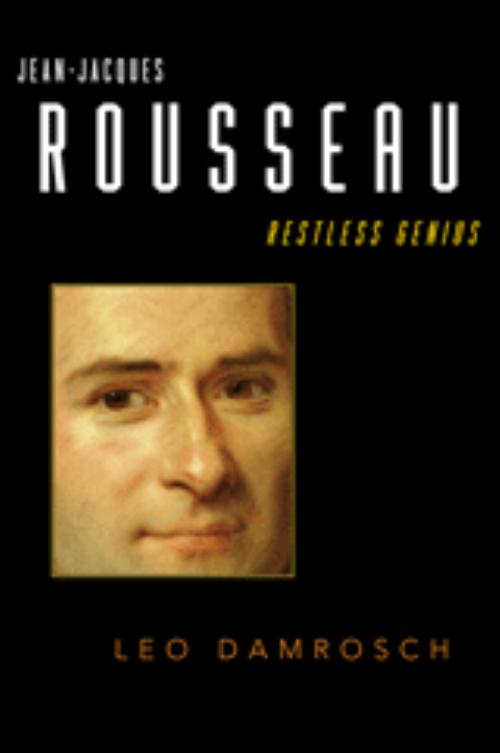From his birthplace in Calvinist Geneva, Jean-Jacques Rousseau migrated toward the hub of Enlightenment-era intellectual activity in Paris. Now, in a new biography, Bernbaum Professor of Literature Leo Damrosch returns Rousseau to center stage, where he belongs.
Like a swift alpine stream, Damrosch’s writing is as enchanting as it is effortless. The biography is not only a pleasant read, but a welcome addition to bookshelves.
Damrosch likes to note that this is the first single-volume Rousseau biography to be written in English. In an interview with The Crimson, Damrosch characterizes the only other in-print Rousseau biography, three volumes by the deceased Maurice Cranston, as “thorough but pedestrian.”
As students of his English 185: “Wit and Humor” are well aware, “pedestrian” is not Damrosch’s style. His narrative is an exhilarating carriage ride through the ancien regime, and it remains lively through 500 pages of well-turned prose.
And a readable biography was Damrosch’s goal. His main concern, he says, was to make Rousseau available to people who know nothing about him, rather than to do original research.
“Reviewers and publishers make something of a fetish of ‘hitherto unpublished material,’” he says. For Rousseau and many other obsessively researched historical figures, new facts are unlikely ever to come to light; but this doesn’t deter Damrosch. The best biographies, he says, are “reinterpretations.”
So is “Jean-Jacuqes Rousseau: Restless Genius” a groundbreaking, must-read reinterpretation? If anything it reinterprets Rousseau’s character, though perhaps “anti-interpretation” describes the biography more accurately. Damrosch’s method is to lay out, to demonstrate. The authorial voice vanishes in the elegant telling of his tale. Do not search these pages for a final judgment of Rousseau. There is none.
But there is a very descriptive account of the man’s life. Rousseau was born in 1712 when Geneva—now Switzerland’s second-largest city—was still a stand-alone republic. After an eventful but unpromising early life, he gravitated toward the Parisian philosophe culture and wrote a string of highly celebrated essays and books staking out novel positions on education, politics, society, religion and the Enlightenment itself.
He quickly became estranged from many former friends, and soon after persecuted by the authorities. After his 1762 critique of religion in “Emile” he fled first to Switzerland, then to Britain, and then, after a bizarre spat with David Hume, back to Paris—where he now lies in the crypt of the Pantheon.
In choosing to present rather than to judge Rousseau’s character, Damrosch effectively frees the reader from judging. People who have heard of Rousseau sometimes feel compelled to stake out one of two positions on his personal failings. Either he was an unbearably nasty man who, by sheer happenstance, wrote books that have inspired humanity for two centuries, or he was a saint pushed into his crimes by the cruel circumstances of his age and the treachery of his so-called friends.
This biography lays out Rousseau’s entire collection of sins against, and services to, humanity. He was not nasty and was not a saint. Ascribing simplistic judgments to such an unusual life is fruitless. Seeing Rousseau’s life in full releases the reader from the need to simplify.
“Restless Genius” is, wisely, not a reinterpretation of Rousseau’s oeuvre, partly because Damrosch refrains from assuming that the reader is familiar with Rousseau’s writing. If he did assume such a familiarity, the book would be horribly inaccessible and unreadable for most people.
Of course, Damrosch pays close attention to Rousseau’s writings. As he puts it, “I’ve tried to weave the life and the works together more closely than biographers usually do.” And he weaves well; for example, Damrosch integrates elements of “Emile,” “Julie,” and the “Social Contract” into the chapter on Rousseau’s early boyhood without a hint of strain.
But though it was wise not to say more about Rousseau’s books and essays than could be understood without reading them, something is still missing. The only problem—a nitpick, perhaps—is that the biography might not quite motivate modern audiences to read Rousseau’s own works. Damrosch is very good at communicating the scope of Rousseau’s influence on later thinkers and entire fields of inquiry, but this is not quite the same.
Isaac Newton’s “Principia” was also ground-breaking and influential, but so far as I know is not required reading among mathematicians and physicists. History is littered with formerly influential writers who are no longer relevant; Rousseau is not one of them, but I am not sure if this will be clear to readers.
Damrosch takes a sunnier view: “I think Rousseau’s published works come out looking amazingly original and alive,” he says, “because seeing them in their original historical context makes one realize how remarkably he escaped the assumptions that make many of his contemporaries’ work seem dated and conventional.”
Be that as it may, Rosseau’s brilliant thoughts are not only amazingly influential—having affected everything from questions of what makes states and institutions legitimate to what form education should take—but still relevant today. I challenge anyone to read “Emile” without seeing the Curricular Review in a new way or to read “The Social Contract” and not reconsider the petty tyranny of the Undergraduate Council.
Reading Rousseau’s autobiographical “Confessions” was a long, hard slog, but the hours spent reading “Restless Genius” simply disappeared like a box of Lindt chocolate truffles. Here we have a good biography—a National Book Award finalist, no less—on a fascinating subject. Those who have a passing acquaintance with his life story should refresh their memory, and those who do not should get acquainted.
—Staff writer Joseph T. Scarry can be reached at scarry@fas.harvard.edu.
Read more in Arts
Light Touches Sparkle in 'You Never Can Tell'













